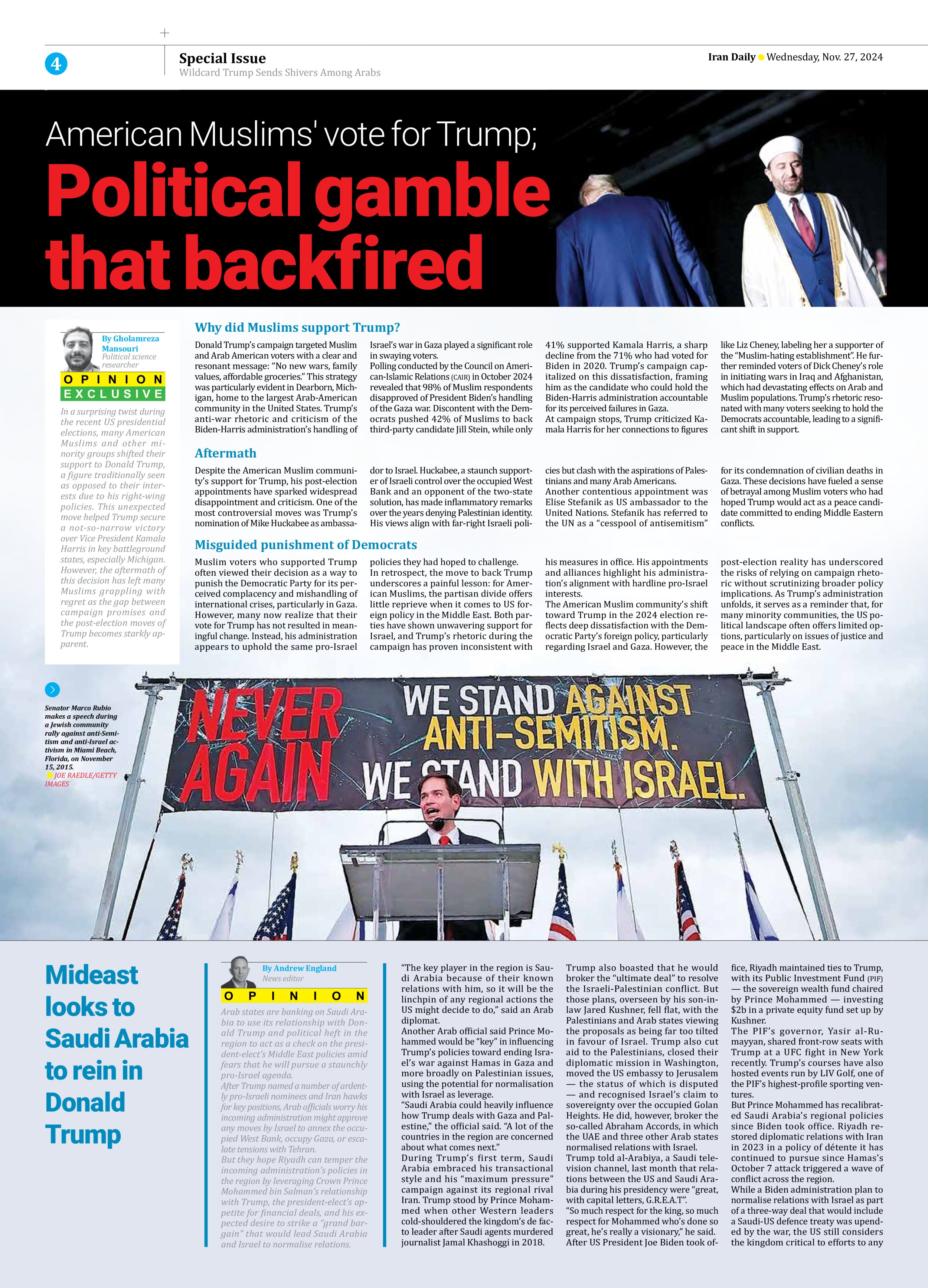
American Muslims’ vote for Trump;
Political gamble that backfired
In a surprising twist during the recent US presidential elections, many American Muslims and other minority groups shifted their support to Donald Trump, a figure traditionally seen as opposed to their interests due to his right-wing policies. This unexpected move helped Trump secure a not-so-narrow victory over Vice President Kamala Harris in key battleground states, especially Michigan. However, the aftermath of this decision has left many Muslims grappling with regret as the gap between campaign promises and the post-election moves of Trump becomes starkly apparent.
By Gholamreza Mansouri
Political science researcher
Why did Muslims support Trump?
Donald Trump’s campaign targeted Muslim and Arab American voters with a clear and resonant message: “No new wars, family values, affordable groceries.” This strategy was particularly evident in Dearborn, Michigan, home to the largest Arab-American community in the United States. Trump’s anti-war rhetoric and criticism of the Biden-Harris administration’s handling of Israel’s war in Gaza played a significant role in swaying voters.
Polling conducted by the Council on American-Islamic Relations (CAIR) in October 2024 revealed that 98% of Muslim respondents disapproved of President Biden’s handling of the Gaza war. Discontent with the Democrats pushed 42% of Muslims to back third-party candidate Jill Stein, while only 41% supported Kamala Harris, a sharp decline from the 71% who had voted for Biden in 2020. Trump’s campaign capitalized on this dissatisfaction, framing him as the candidate who could hold the Biden-Harris administration accountable for its perceived failures in Gaza.
At campaign stops, Trump criticized Kamala Harris for her connections to figures like Liz Cheney, labeling her a supporter of the “Muslim-hating establishment”. He further reminded voters of Dick Cheney’s role in initiating wars in Iraq and Afghanistan, which had devastating effects on Arab and Muslim populations. Trump’s rhetoric resonated with many voters seeking to hold the Democrats accountable, leading to a significant shift in support.
Aftermath
Despite the American Muslim community’s support for Trump, his post-election appointments have sparked widespread disappointment and criticism. One of the most controversial moves was Trump’s nomination of Mike Huckabee as ambassador to Israel. Huckabee, a staunch supporter of Israeli control over the occupied West Bank and an opponent of the two-state solution, has made inflammatory remarks over the years denying Palestinian identity. His views align with far-right Israeli policies but clash with the aspirations of Palestinians and many Arab Americans.
Another contentious appointment was Elise Stefanik as US ambassador to the United Nations. Stefanik has referred to the UN as a “cesspool of antisemitism” for its condemnation of civilian deaths in Gaza. These decisions have fueled a sense of betrayal among Muslim voters who had hoped Trump would act as a peace candidate committed to ending Middle Eastern conflicts.
Misguided punishment of Democrats
Muslim voters who supported Trump often viewed their decision as a way to punish the Democratic Party for its perceived complacency and mishandling of international crises, particularly in Gaza. However, many now realize that their vote for Trump has not resulted in meaningful change. Instead, his administration appears to uphold the same pro-Israel policies they had hoped to challenge.
In retrospect, the move to back Trump underscores a painful lesson: for American Muslims, the partisan divide offers little reprieve when it comes to US foreign policy in the Middle East. Both parties have shown unwavering support for Israel, and Trump’s rhetoric during the campaign has proven inconsistent with his measures in office. His appointments and alliances highlight his administration’s alignment with hardline pro-Israel interests.
The American Muslim community’s shift toward Trump in the 2024 election reflects deep dissatisfaction with the Democratic Party’s foreign policy, particularly regarding Israel and Gaza. However, the post-election reality has underscored the risks of relying on campaign rhetoric without scrutinizing broader policy implications. As Trump’s administration unfolds, it serves as a reminder that, for many minority communities, the US political landscape often offers limited options, particularly on issues of justice and peace in the Middle East.







